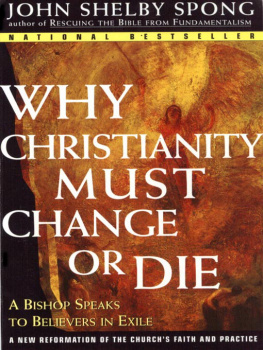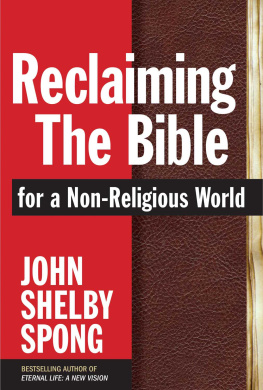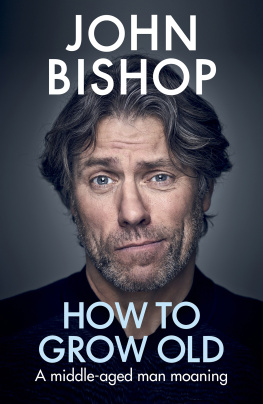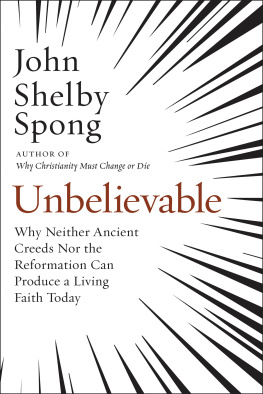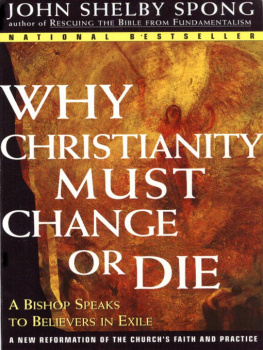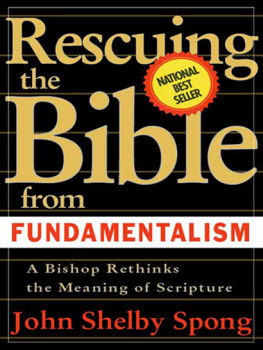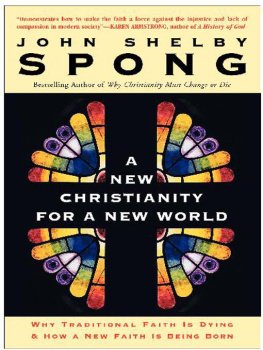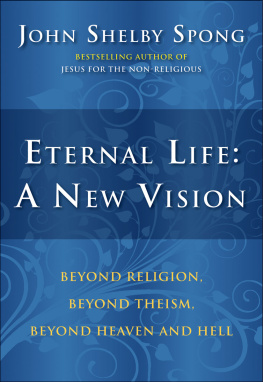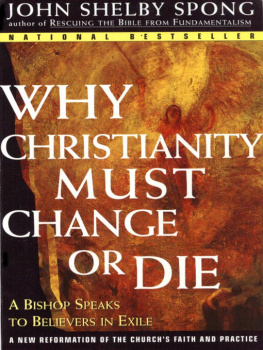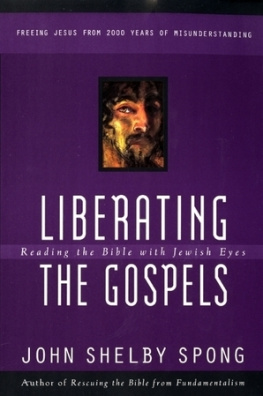T HIS BOOK HAS BEEN in progress for more than twenty years. It is a work of faith and conviction. It is my witness as one who desires to worship as a citizen of the modern world and to be able to think as I worship. I write it as a person to whom the Christian Church has accorded honor, rank, and the privilege of leadership in the episcopal office. It comes thus from the life of a bishop whose vows at the time of my consecration included both a promise to defend the faith and to guard the unity of the church. The vocation of doing just that in a rapidly changing world has been my privilege for almost a quarter of a century.
As the author of these pages, I am aware that I can hardly be mentioned in the public press without the adjective controversial being attached to my name. That word has almost become a part of my identity.
The first occasion for this acquired reputation came in 1974, when as a priest in Richmond, Virginia, I had the pleasure of conducting an extensive public dialogue with Dr. Jack Daniel Spiro, the rabbi of Richmonds Reformed Temple Beth Ahabah.
This dialogue developed because of a book I had published in 1974 entitled This Hebrew Lord . The rabbi, intrigued by this title, read the book and invited me to debate its content with him at the synagogue on three successive Sabbath eve services. As we talked together to plan this event, the format grew to include three Sunday mornings at St. Pauls Episcopal Church, the parish where I was serving located in downtown Richmond. This dialogue excited the public, and both synagogue and church were crowded for each session. It also caught the attention of the newspapers, radio, and television in the Richmond area and was covered extensively.
On one Friday evening during this dialogue, the rabbi asked me to explain to his Jewish audience just how God, the Holy Other, could be said to have become particular and concrete in the person of Jesus of Nazareth, which was his understanding of the Jesus claim made by Christians.
Seeking in my response to avoid some ideas from popular Christian theology that border on the heresy of monophysitism, because the Jewish people discerned that the will of God was being accomplished in history through the life of this man who knew neither the Torah nor even the name of Yahweh.
In response to the rabbis questions on that Sabbath eve, I asserted, The Bible never says in a simplistic way that Jesus is God. Jesus prays to God in the Gospels. He is not talking to himself. Jesus dies on the cross. It makes no sense to say that the holy God died. The Bible only says that what God is, Jesus is; that God is met in Jesus; that to see Jesus is in some sense to see God. I was pleased with both my answer and with the response of my Jewish audience. It was, however, a theological distinction far too subtle for the secular press to grasp.
Jesus Is Not God, Rector Asserts was the headline greeting readers of the Richmond Times Dispatch the next day, and the debate was on. Letters to the editor defending Jesus divinity against this heretical priest flooded that newspaper for at least six weeks. St. Pauls Church was picketed by placard-carrying members of the Janke Road Baptist Church, protesting Jesus demotion. The conservative church press, led by the crusty editor of The Living Church , Carroll Simcox, and Perry Laukhuff, the right-wing editor of a now-defunct newsletter entitled The Certain Trumpet , took up the challenge.
This event occurred during a time of great upheaval in the Episcopal Church, when women were demanding access to ordi nation. In protest against the slow bureaucratic church decision-making process, women had been ordained irregularly in Philadelphia in 1974 and in Washington in 1975. An enormous amount of anger against these changes was flowing from conservative advocates, who wished to purge the church of those who broke rank with the historic faith and practice of an all-male Christian priesthood. The bishop of the Diocese of Virginia, Robert B. Hall, was known to be sympathetic to ordaining women. When one of the irregularly ordained women concelebrated the Eucharist in a church of that diocese with Bishop Hall in the congregation, he responded to his critics by claiming that his eyes were closed in prayer so that he did not see the presence of the offending woman. Conservatives were not pleased. So the combination of this liberal bishop, who would not uphold the churchs ban against women, with this liberal priest in dialogue with Jewish people caused the right-wing religious press to refer to conservative Virginia as a disaster area. The Diocese of Virginia had never been so significantly honored before.
This debate had just begun to cool down when I was elected Bishop of Newark on March 6, 1976. Now the rector who denied that Jesus was God would be one of the ruling bishops of the church. It was more than the likes of Simcox and Laukhuff could manage. So they mounted a national campaign to prevent my election from being confirmed. Quotations from This Hebrew Lord were lifted from its pages and circulated widely to every bishop and to the members of every diocesan standing committee in the United States. Assisted by the Reverend Dr. Philip Cato, I wrote a careful and reasoned response to these rather reckless charges. It did not help. A new Bishop Pike is being born, the press asserted. One diocese, West Virginia, where I had declined a year earlier to be a candidate for bishop, now decided I was not fit to be a bishop anywhere. Yet, when the votes were cast, I was overwhelmingly confirmed, with only seven standing committees actually voting no. The effect of that campaign, however, was, first, that the sales of This Hebrew Lord spiked and, second, that I entered the House of Bishops better known than bishops who had been in that house for decades. The reputation as controversial, heretical, even as a nonbeliever, has never departed from the minds of my critics.
A book that I published in 1983, entitled Into the Whirlwind: The Future of the Church , contained all of the seeds of my future work. I called on the Christian Church to enter the knowledge revolution, the sexual revolution, and the revolution against tribal identity and prejudices in a radically interdependent modern world. But because this volume was still in the realm of the theoretical and the speculative, it did not fan the embers of the dormant controversy. It also sold fewer than twenty thousand copies and so was little noticed.
All of that changed in the late eighties when the issue of the churchs discrimination against gay and lesbian people came to a head. In 1987 the Diocese of Newark became the first diocese in the Anglican Communion to call on the church officially to end its homophobic practices and to be honest about ordaining qualified gay and lesbian candidates to the priesthood. This diocese also asked the church to take whatever action might be necessary to free its clergy to bless publicly the sacred commitments of gay and lesbian couples. In 1988 I published a book designed to call the church to a new awareness of these sexual issues. It was entitled Living in Sin?: A Bishop Rethinks Human Sexuality . On December 16, 1989, responding to my own study and to the recommendation of the decision-making bodies of the Diocese of Newark, I proceeded to ordain to the priesthood a man who for about five years had lived in a publicly acknowledged, committed relationship with his male partner. He was a seminary graduate who also possessed the glowing endorsement of his theological faculty. The issue was theoretical no longer.

